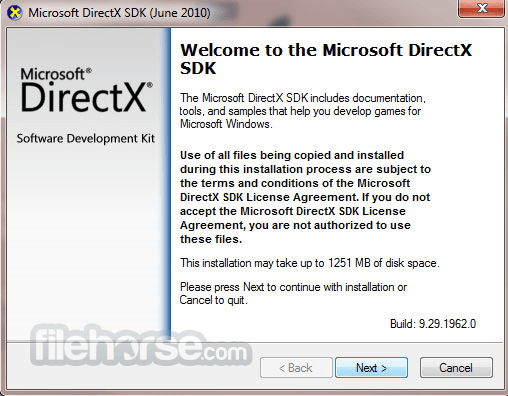-
Latest Version
DirectX SDK 9.29.1962 (June 2010) LATEST
-
Review by
-
Operating System
Windows XP / Vista / Windows 7 / Windows 8
-
User Rating
Click to vote -
Author / Product
-
Filename
DXSDK_Jun10.exe
-
MD5 Checksum
a7fa610b1791d873162b9e33007a6777
This DirectX SDK release contains updates to tools, utilities, samples, documentation, and runtime debug files for x64 and x86 platforms.
Microsoft originally created the DirectX SDK as a high-performance platform for game development on top of Windows. As DirectX technologies matured, they became relevant to a broader range of applications.
Today, the availability of Direct3D hardware in computers drives even traditional desktop applications to use graphics hardware acceleration. In parallel, DirectX technologies are more integrated with Windows. DirectX is now a fundamental part of Windows.
This release includes changes to the D3DX library, graphics samples, tools, and documentation updates. Updated developer runtimes and the DirectX Redistributable (DirectX 9.0c) are also included.
Key Features
Graphics Rendering: It provides a wide range of APIs for 2D and 3D graphics rendering, allowing developers to create lifelike visuals and stunning graphics effects.
Audio Support: With DirectX, developers can incorporate advanced audio features such as spatial audio and positional audio for a more immersive auditory experience.
Input Handling: The SDK offers support for various input devices, including game controllers, mice, and keyboards, making it easy to create responsive and interactive gameplay.
Multimedia Playback: DirectX includes libraries for multimedia playback, making it possible to integrate video and audio playback seamlessly into your applications.
Shader Programming: Developers can leverage HLSL (High-Level Shading Language) to create complex and customizable shaders for realistic lighting, shadows, and special effects.
Cross-Platform Compatibility: While DirectX is primarily associated with Windows, it offers some cross-platform support through DirectX 12 Ultimate, allowing developers to target Xbox consoles and PC simultaneously.
User Interface
It primarily consists of command-line tools and libraries, making it more developer-centric than user-centric.
While it lacks a graphical user interface (GUI), it offers comprehensive documentation and samples to help developers utilize its features effectively.
Installation and Setup
- Download: It can be downloaded from the official Microsoft website or FileHorse.
- Installation: The installation process is straightforward, following typical software installation procedures.
- Configuration: Developers need to configure their development environment to include the DirectX SDK libraries and tools.
- Install the SDK as mentioned earlier.
- Refer to the documentation for specific tasks and functions you want to implement in your game or application.
- Utilize the provided samples as a reference or starting point for your own projects.
What is DirectX SDK used for?
DirectX SDK is primarily used by game developers to create high-performance graphics, audio, and multimedia applications on Windows-based platforms.
Is DirectX SDK compatible with Windows 10 and Windows 11?
Yes, DirectX SDK is compatible with both Windows 10 and Windows 11, offering support for the latest DirectX 12 features.
Can I use DirectX SDK for cross-platform development?
While DirectX is primarily Windows-centric, DirectX 12 Ultimate offers some cross-platform compatibility, allowing developers to target Xbox consoles and PC.
Do I need a specific IDE to work with DirectX SDK?
No, it can be used with various development environments, including Visual Studio.
Is DirectX SDK free to use?
Yes, DirectX SDK is freely available for download and use by game developers and software creators.
Alternatives:
OpenGL: OpenGL is an open-source alternative to DirectX, primarily used for cross-platform 2D and 3D graphics rendering.
Unity: Unity is a popular game development engine that abstracts much of the low-level graphics programming, making it accessible for a broader range of developers.
Unreal Engine: Unreal Engine is another powerful game engine with its own set of tools and features for creating high-quality games and simulations.
System Requirements
- Windows Server 2008, Windows XP, Windows Server 2003, Windows 7, Windows Vista
- A development environment such as Visual Studio
- Compatible hardware for testing and development
- Comprehensive toolkit for game and multimedia development.
- Powerful graphics and audio capabilities.
- Cross-platform support through DirectX 12 Ultimate.
- Free to use.
- Extensive documentation and samples.
- This download represents the retired DirectX SDK, and it is no longer actively supported. It should be exclusively employed for the purpose of preserving and managing older software.
- Lack of a graphical user interface (GUI) may be intimidating for beginners.
- Primarily Windows-centric, limiting cross-platform development.
- Some features require a good understanding of low-level graphics programming.
DirectX SDK is an indispensable tool for game developers and multimedia creators on Windows-based platforms. With its extensive set of features and robust capabilities, it empowers developers to bring their visions to life with stunning graphics, immersive audio, and interactive experiences.
While it may not be the easiest toolkit to master, the rewards of utilizing DirectX SDK are well worth the effort, making it a fundamental asset in the world of game development.
Note: Requires .NET Framework.
 OperaOpera 118.0 Build 5461.41 (64-bit)
OperaOpera 118.0 Build 5461.41 (64-bit) PC RepairPC Repair Tool 2025
PC RepairPC Repair Tool 2025 PhotoshopAdobe Photoshop CC 2025 26.5.0 (64-bit)
PhotoshopAdobe Photoshop CC 2025 26.5.0 (64-bit) OKXOKX - Buy Bitcoin or Ethereum
OKXOKX - Buy Bitcoin or Ethereum iTop VPNiTop VPN 6.4.0 - Fast, Safe & Secure
iTop VPNiTop VPN 6.4.0 - Fast, Safe & Secure Premiere ProAdobe Premiere Pro CC 2025 25.2.1
Premiere ProAdobe Premiere Pro CC 2025 25.2.1 BlueStacksBlueStacks 10.42.51.1001
BlueStacksBlueStacks 10.42.51.1001 Hero WarsHero Wars - Online Action Game
Hero WarsHero Wars - Online Action Game SemrushSemrush - Keyword Research Tool
SemrushSemrush - Keyword Research Tool LockWiperiMyFone LockWiper (Android) 5.7.2
LockWiperiMyFone LockWiper (Android) 5.7.2


Comments and User Reviews